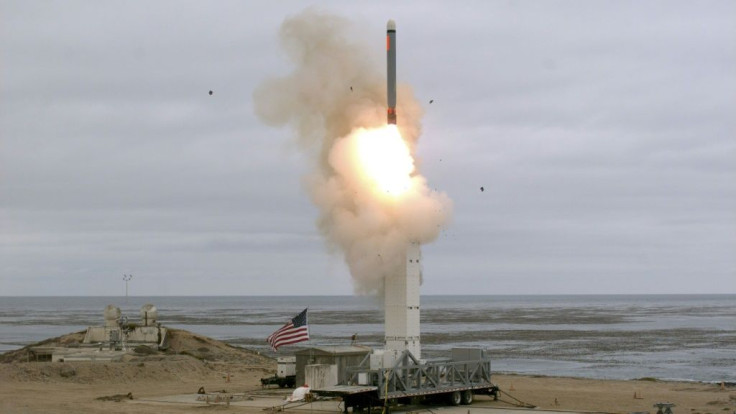U.S. Accounted For Nearly Half Of Global Nuclear Weapons Spending In 2019

KEY POINTS
- U.S. spent $35.4 billion on its nuclear arms program last year
- China spent $10.4 billion on nuclear weapons
- Russia possesses the world's largest nuclear arsenal with 6,370 nuclear weapons
Nine nuclear powers spent $72.9 billion last year on their nuclear weapons arsenals, or nearly $138,700 every minute, according to the Geneva-based International Campaign to Abolish Nuclear Weapons, or ICAN.
All told, global nuclear arms spending jumped by 10% over the previous year.
Almost half of that spending came from the U.S., which laid out some $35.4 billion on operating and developing nuclear weapons and nuclear-capable delivery systems last year. The 2019 expenditure in the U.S. exceeded the prior year by $5.8 billion.
In 2019, China spent $10.4 billion on nuclear weapons, the U.K. spent $8.9 billion, Russia spent $8.5 billion, France spent $4.8 billion, India spent $2.3 billion, Israel spent $1 billion, Pakistan spent $1 billion and North Korea spent $600 million.
ICAN reported that Russia, China, India, U.K. and France all increased their nuclear arms budgets in 2019, while Israel and North Korea kept their spending at about the same level. Pakistan was the only nuclear power to reduce its nuclear weapon budget.
Russia reportedly possesses the world's largest nuclear arsenal with 6,370 nuclear weapons, compared to 5,800 in the U.S.
Russia has revealed the development of a number of new weapons, including nuclear-powered, long-distance cruise missiles, underwater long-distance nuclear torpedoes and a new heavy intercontinental ballistic missile.
However, Moscow’s nuclear arms budget amounted to less than one-quarter of the comparable U.S. budget.
"The billions thrown away on nuclear weapons could instead be funding supplies and research needed to help people around the world fight COVID-19," ICAN stated.
ICAN Executive Director Beatrice Fihn said these governments were "abdicating their duty to protect their people."
"It is absurd to be spending $138,700 every single minute on weapons that cause catastrophic human harm rather than spending it to protect the health of their citizens," she said.
ICAN also said that these countries continue to waste billions every year on weapons of mass destruction that will “soon be illegal,” citing the Treaty on the Prohibition of Nuclear Weapons, which bans the development, production and manufacture of nuclear arms. The treaty now has 36 ratifications or accessions and 81 signatures and will become effective once it reaches 50 ratifications or accessions. (However, none of the nine aforementioned nuclear states have ratified the treaty).
ICAN also reported that in France, the U.K. and the U.S., each nation’s spending on nuclear weapons could have instead paid for at least 100,000 intensive care unit beds, tens of thousands of ventilators and tens of thousands of annual salaries for nurses and doctors.
“It’s clear now more than ever that nuclear weapons do not provide security for the world in the midst of a global pandemic, and not even for the nine countries that have nuclear weapons, particularly when there are documented deficits of healthcare supplies and exhausted medical professionals,” said Alicia Sanders-Zakre, policy and research coordinator at ICAN.
Meanwhile, the New START (Strategic Arms Reduction Treaty) which was designed to reduce the development of nuclear weapons in the U.S. and Russia is set to expire next year, with no word of an extension.
According to the U.S. Congressional Budget Office, the cost of the nuclear weapons program in the U.S. will reach $500 billion over this decade.
However, Kingston Reif, the director for disarmament and threat reduction policy at the Arms Control Association, said budget limitations in a coronavirus-related recession might serve to cut nuclear arms spending.
“There’s going to be significant pressure on federal spending moving forward, including defense spending,” Reif said. “So, the cost and opportunity cost of maintaining and modernizing the arsenal, which were already punishing, will become even more so.”
© Copyright IBTimes 2024. All rights reserved.





















